牛津译林英语九年级上册 Unit 1-2语言要点和语法拓展 课件(52张)
文档属性
| 名称 | 牛津译林英语九年级上册 Unit 1-2语言要点和语法拓展 课件(52张) |
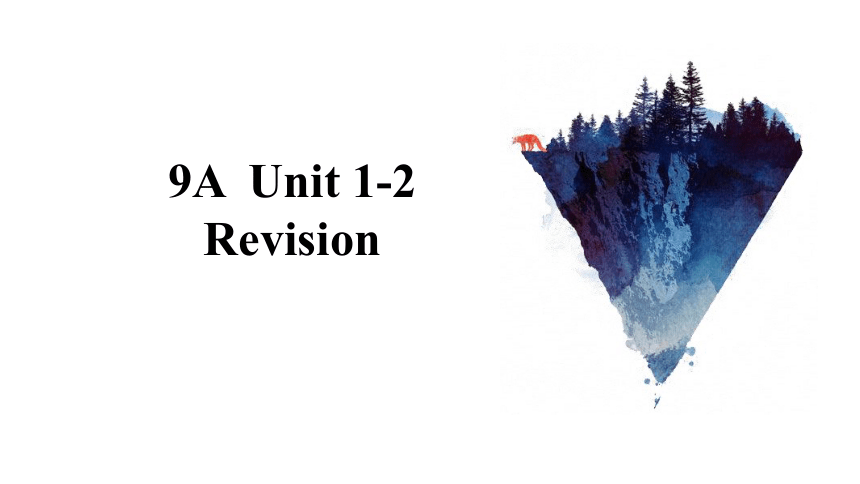
|
|
| 格式 | zip | ||
| 文件大小 | 21.1MB | ||
| 资源类型 | 教案 | ||
| 版本资源 | 牛津译林版 | ||
| 科目 | 英语 | ||
| 更新时间 | 2020-05-19 00:00:00 | ||
图片预览

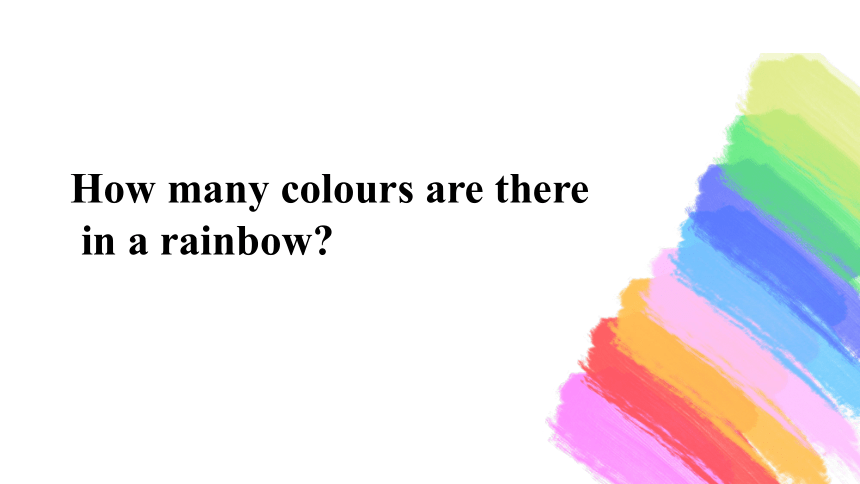

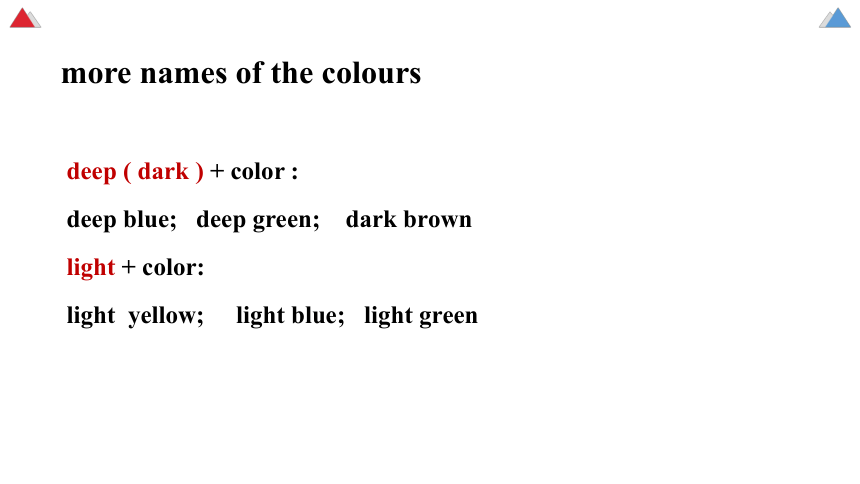
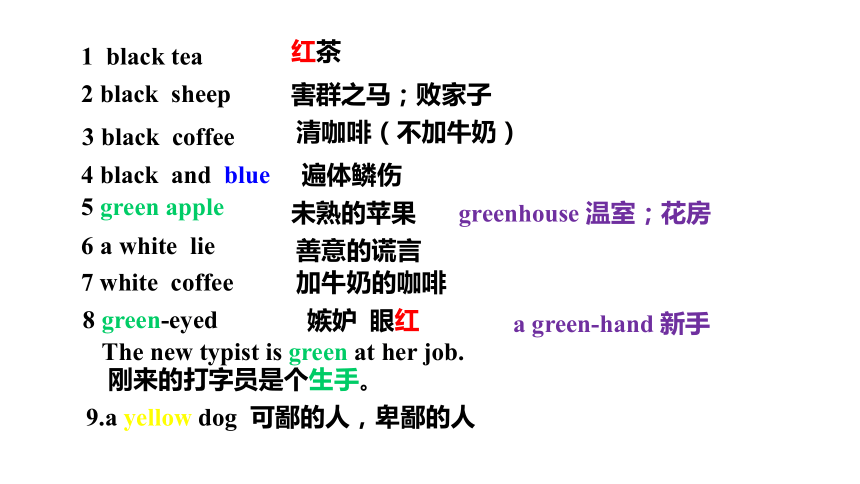

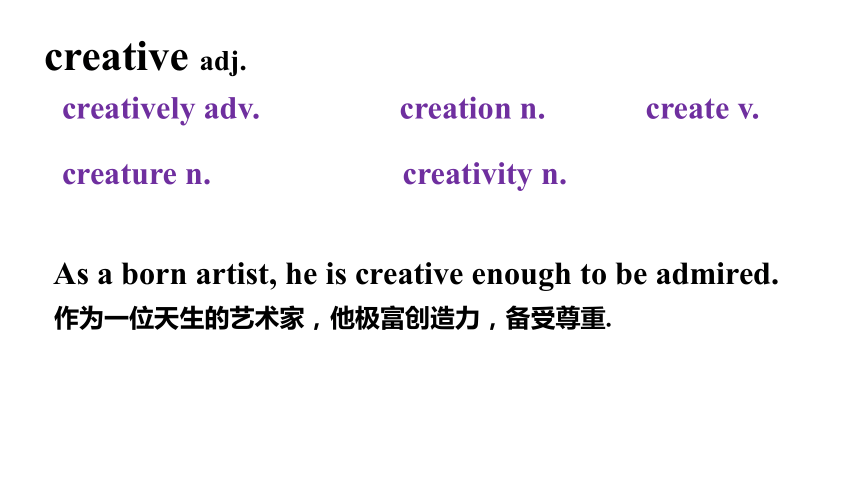
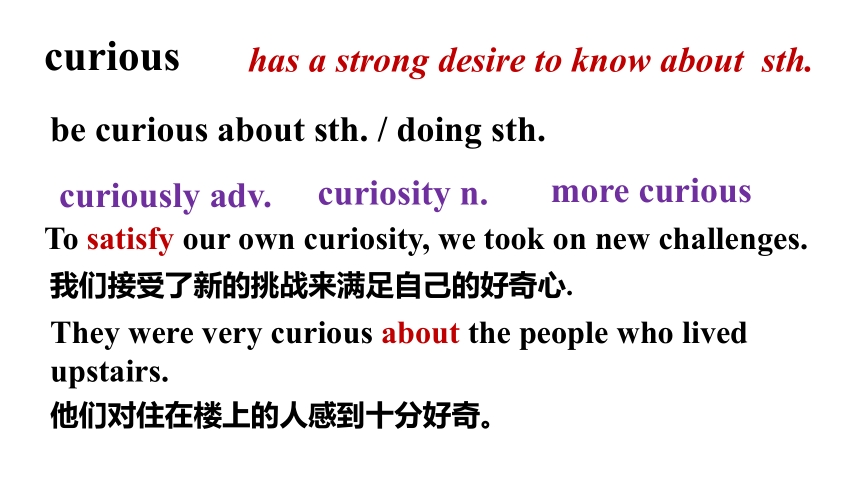
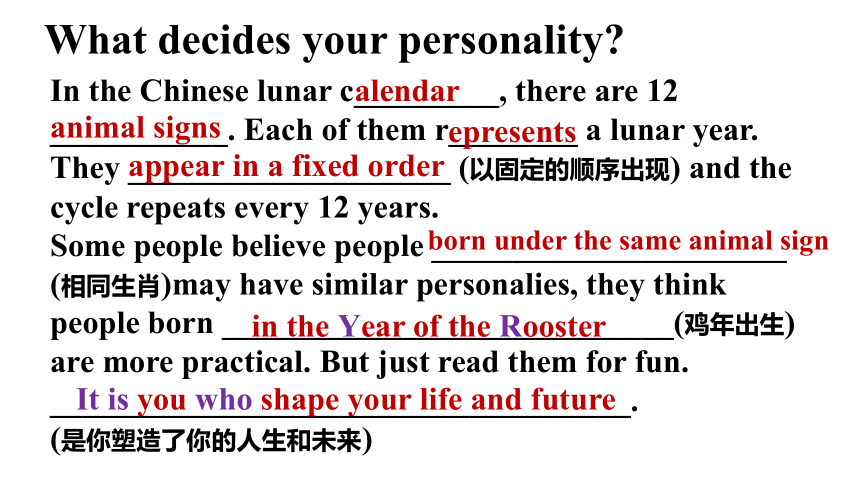
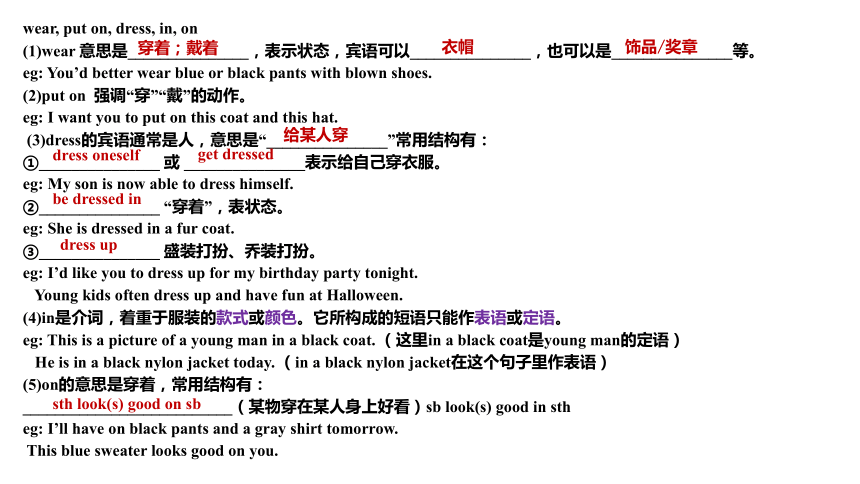
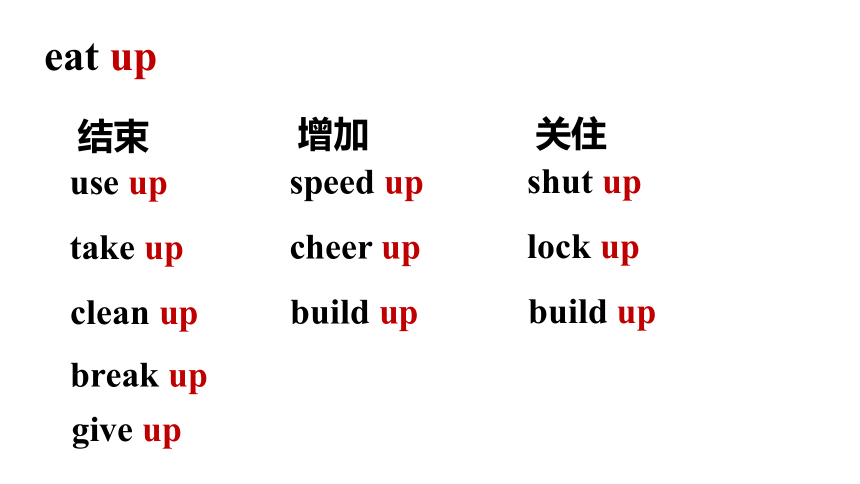
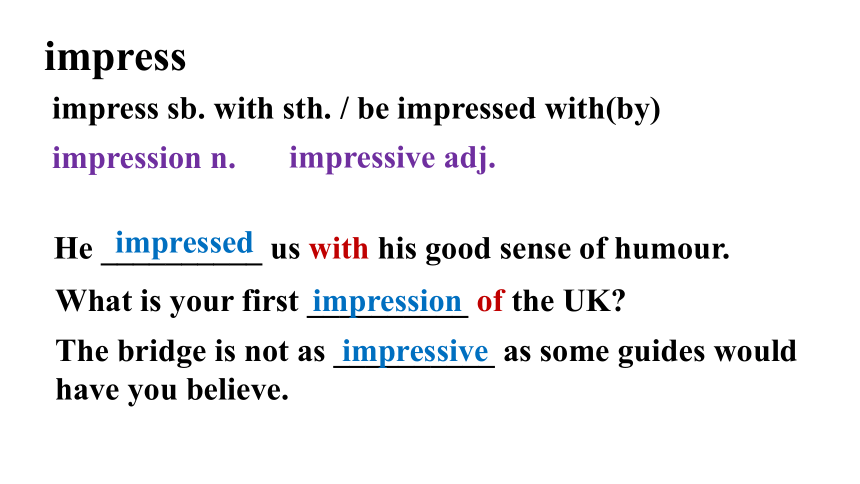
文档简介
(共52张PPT)
9A Unit 1-2
Revision
How many colours are there
in a rainbow?
red
orange
yellow
green
blue
indigo
violet
Colours of the rainbow
very dark blue
bluish purple
more names of the colours
deep ( dark ) + color :
deep blue; deep green; dark brown
light + color:
light yellow; light blue; light green
1 black tea
2 black sheep
3 black coffee
红茶
害群之马;败家子
清咖啡(不加牛奶)
4 black and blue
遍体鳞伤
5 green apple
未熟的苹果
6 a white lie
善意的谎言
7 white coffee
加牛奶的咖啡
8 green-eyed
嫉妒 眼红
The new typist is green at her job.
刚来的打字员是个生手。
9.a yellow dog 可鄙的人,卑鄙的人
greenhouse 温室;花房
a green-hand 新手
personalities
creative
curious
energetic
modest
organized
patient
optimistic
independent
loyal
unselfish
thoughtful
out-going
creative adj.
creatively adv.
creativity n.
creature n.
create v.
creation n.
As a born artist, he is creative enough to be admired.
作为一位天生的艺术家,他极富创造力,备受尊重.
curious
be curious about sth. / doing sth.
has a strong desire to know about sth.
curiously adv.
curiosity n.
more curious
To satisfy our own curiosity, we took on new challenges.
我们接受了新的挑战来满足自己的好奇心.
They were very curious about the people who lived upstairs.
他们对住在楼上的人感到十分好奇。
What decides your personality?
In the Chinese lunar c_________, there are 12 ___________. Each of them r________ a lunar year. They ____________________ (以固定的顺序出现) and the cycle repeats every 12 years.
Some people believe people ______________________ (相同生肖)may have similar personalies, they think people born ____________________________(鸡年出生) are more practical. But just read them for fun. ____________________________________.
(是你塑造了你的人生和未来)
alendar
animal signs
epresents
appear in a fixed order
born under the same animal sign
in the Year of the Rooster
It is you who shape your life and future
wear, put on, dress, in, on
(1)wear 意思是_______________,表示状态,宾语可以_______________,也可以是_______________等。
eg: You’d better wear blue or black pants with blown shoes.
(2)put on 强调“穿”“戴”的动作。
eg: I want you to put on this coat and this hat.
(3)dress的宾语通常是人,意思是“_______________”常用结构有:
①_______________ 或 _______________表示给自己穿衣服。
eg: My son is now able to dress himself.
②_______________ “穿着”,表状态。
eg: She is dressed in a fur coat.
③_______________ 盛装打扮、乔装打扮。
eg: I’d like you to dress up for my birthday party tonight.
Young kids often dress up and have fun at Halloween.
(4)in是介词,着重于服装的款式或颜色。它所构成的短语只能作表语或定语。
eg: This is a picture of a young man in a black coat. (这里in a black coat是young man的定语)
He is in a black nylon jacket today. (in a black nylon jacket在这个句子里作表语)
(5)on的意思是穿着,常用结构有:
__________________________(某物穿在某人身上好看)sb look(s) good in sth
eg: I’ll have on black pants and a gray shirt tomorrow.
This blue sweater looks good on you.
?
穿着;戴着
衣帽
饰品/奖章
给某人穿
dress oneself
get dressed
be dressed in
dress up
sth look(s) good on sb
eat up
use up
take up
clean up
结束
break up
speed up
cheer up
build up
增加
shut up
lock up
build up
关住
give up
impress
impress sb. with sth. / be impressed with(by)
impression n.
impressive adj.
He __________ us with his good sense of humour.
What is your first __________ of the UK?
The bridge is not as __________ as some guides would have you believe.
impression
impressed
impressive
be happy with
be satisfied with
be pleased with
be unhappy with
Many students of my age are unhappy with their grades.
很多与我同龄的学生都对自己的成绩不满意。
praise
win high praise
praise... for/ highly
think highly of
My teacher praised me for the great progress I had made.
老师表扬了我所取得的巨大进步。
The sculptures which displayed in the square were thought
highly of by citizens.
广场上展览的雕塑被市民们高度评价。
devote
devote sth.(time/energy/effort)/ oneself to doing
Audrey Hepburn devotes the rest of her life to charity
work.
As a soldier, he showed selfless _________ to duty and country.
奥黛丽赫本将她的余生都奉献给了慈善事业.
devotion
You can't be too careful.
The news sounds too good to be true.
can't + 比较级 表最高级
It couldn't be better.
I can't agree with you more.
We couldn't have a worse day.
You can't praise the film too much.
recommend
recommend sb. as/ for/ to be
as our monitor
to be a heart surgeon
for the position
recommendation n.
a formal recommendation
absent
be absent from (school/ class)
absence
They are making up excuses for their absence.
他们正在为缺席编造借口。
influence
have a/ an (great) influence on
influence sb./ sth.
affect sb. /sth.
have an effect on
make a difference to
Could you tell me who influenced you most?
你能告诉我谁影响你最深吗?
prefer
prefer sth. prefer to do
prefer A to B prefer doing A to doing B
prefer to do A rather than do B
would rather do A than do B
-red/ -ring
I would prefer that you didn’t mention my name.
我宁愿你不提及我的名字
preference n.
Many people expressed a strong ___________for the
original plan.
preference
envy
n./ v.
green with envy
envy my success
jealous adj.
be jealous of sb./ sth.
He is jealous of my success.
promise
n./ v.
promise sb. sth. / promise sth. to sb.
promise to do/ that
keep/ break/ make one’s promise
I have promised him not to smoke any more.
我已承诺他不再抽烟了。
They arrived as they promised.
他们按承诺的时间到达了。
require
require sth.
require sb to do sth.
require doing sth.= require to be done
need doing = need to be done
The poor man __________ some food and water now.
The flowers require ___________(water).
requires
watering
to be watered
requirement
request
需求
要求
remind
remind sb of sth.
remind sb to do sth.
remind sb that
The TV programme last night reminded my sister of her experience as a volunteer teacher in the mountain areas two years ago.
昨晚的电视节目使我姐姐想起来两年前在山村支教的经历。
Grammar
连 词 (Conjunction)
一、连词定义: 用来连接词、短语或句子的词。
e.g. I study English and Chinese.
Does he work at school or in the hospital?
I get up early, but my brother gets up late.
并列连词
从属连词—
连词:and, but, or, so, for
连词词组: either…or, neither…nor, not only…but also, both…and, (as well as)
that, whether, if, unless, while / when, until, because, so that, so…that, though/ although, even if, as…as 等
分类
并列连词 --- 连接具有并列关系的词,短语或句子。常见并列连词:
1. 表并列关系: and, not?only…but?also, neither…nor
2. 表选择关系:or, otherwise, or?else, either
3. 表转折关系:but, yet, still?, however
4. 说明原因: for?
5. 表示结果: so
用法
1)判断改错:
They sat down and talk about something.
They started to dance and sang.
I saw two men sitting behind and ate there.
F
F
F
and (“和,并且”)
eating
sing
talked
“and” 连接平行结构。
either A or B “或者A或者B”
neither A nor B “既不A也不B”
not only A but also B “不仅A而且B”
连词词组
Either you or I _____ (be) going to the party.
(或者你或者我将去晚会)
Neither I nor he _____ (have) seen the movie.
(我和他都没有看过这部电影)
Not only you but also he ___ (speak) French.
(不但你而且他也讲法语)
【连接主语时,谓语“就近原则”】
am
has
speaks
(1)肯定句中用“and” 表“和”;
(2)否定句中用“or”表“和” 。
我喜欢英语和数学。
我不喜欢英语和数学。
I like English _____ math.
I don't like English ____ math.
and
or
and / or
= Study hard, _____ your math will be worse.
Study hard, _____ your math will be better.
and
or
“and”意为“这样,那么”+ 比较好的结果(承接);
“or” 意为 “否则” +不理想的结果(前后相反) 。
表转折的连词but 和however:
e.g. (他努力工作,但以失败告终。)
He worked hard, ______ he failed at last.
He worked hard. _________, he failed at last.
区别: but 后没有逗号,直接连接分句;
however 后有逗号相隔,可放句末。
but
However
although/ though 和but这两个关联词不能同用。
(1) Although he is over sixty, but he works as hard as others.
改为:Although he is over sixty, he works as hard as others.
或 He is over sixty, but he works as hard as others.
(2) Because John was ill, so I took him to the doctor.
改为:John was ill, so I took him to the doctor.
或:Because John was ill , I took him to the doctor。
because 和 so 等关联词都不能同时使用。
The Object Clause
宾语从句
什么是宾语从句
I know the girl.
主语
谓语
宾语
简单句
I know (that ) the girl is from England.
主语
谓语
宾语
复合句
(句中有句)
宾语从句
(是一个名词)
宾语是一个句子
宾语从句的概念
在复合句中作宾语的句子叫宾语从句。
宾语从句一般位于及物动词或介词后。
主 句
引导词
宾 语 从 句
eg. I know that the girl is from England.
主句通常很简短,例如:
I think…. He says/ said….
Do you know…? Could you tell me…?
主句意思未完整,要加上从句意思才完整。
一、引导词
二、语 序
三、时 态
宾语从句三个考点
(三种)
(用陈述句语序)
(看主句再决定)
引导陈述句意义的宾语从句
引导特殊疑问句意义的宾语从句
引导一般疑问句意义的宾语从句
一、宾语从句的引导词(三种)
1.that
2.whether, if
3.wh-, how (特殊疑问词)等
不同的引导词引导不同意义的宾语从句
1.that
2.if / whether “是否”
3. wh-,how
1) I hear ______________________________.
2) He said ________________________________.
he will come back in an hour
he liked basketball very much
1、陈述句意义的宾语从句引导词用 that
that 在句中无词义,常省略。
他将在一小时后回来
他非常喜欢篮球
(that)
(that)
I think (that) ____________ .
you are right
注意1 :I think 后的宾语从句的否定前置。
I think (that) + 肯定句.
如果I think后的宾语从句表达否定的意义,否定前置。
I don't think (that) +肯定句.
我认为你是对的。
I _____think (that) ______________.
我认为你是不对的。
you are right
don’t
2.一般疑问句意义的宾语从句引导词用if / whether “是否”
1) I asks him ______________________________.
2) Could you tell me ________________________________?
he has been to Beijing
the bus will arrive on time
if/ whether 要译成 “是否,是不是”,不能省略,说明对陈述的事物不明确或不清楚。常用在ask, wonder, can/ could you tell me 等后。
他是否去过北京
公交车是否将会按时到达
if /whether
if/whether
(他去过北京吗?)
(公交车将会按时到达吗?)
1)当与or not连用时
I don’t know whether he’s free or not.
Mary asked whether I was doing my homework or not.
2) 在介词后面
We are worried about whether it will rain tomorrow.
3) whether to do
I am thinking whether to buy a car.
(=I am thinking whether I should buy a car.)
注意2:只能用whether的情况
1) I don’t know___________________.
2) Do you know _______________________________?
they are doing
we will go to the zoo tomorrow
特殊疑问词作引导词,有词义,要翻译出来,不可省略。
他们在做什么
我们明天将怎样去动物园
3. 特殊疑问句意义的宾语从句引导词用wh-,how
what
how
if 和 when 既能引导状语从句,又能引导宾语从句。遇到它们就要认真分析一下。如:
1. I don’t know if it will rain tomorrow.
I will go fishing if it doesn’t rain tomorrow.
2. I don’t know when he will come back.
I will tell him the news when he comes back.
注意3
if 是否
if 如果
when 何时
when 当…时
宾语从句
条件状语从句
宾语从句
时间状语从句
1. 陈述句意义的宾语从句引导词用 that
宾语从句的引导词
2. 一般疑问句意义的宾语从句引导词用if / whether “是否”
3. 特殊疑问句意义的宾语从句引导词用wh-,how
选择宾语从句的引导词时,要符合句子或对话的逻辑意义。
There is no doubt that......
1. I hear that he will come back in an hour.
2. He said that he liked basketball very much.
3. I asks him if / whether he has been to Beijing.
4. Could you tell me if/ whether the bus will arrive on time?
5. I don’t know what they are doing.
6. Do you know how we will go to the zoo tomorrow?
二、宾语从句的语序
(引导词后)用陈述句语序
主语+谓语 +其它 (陈述句)
引导词后是:
I don't know what's wrong with.../ what's the matter?(疑问词做主语)
三、 宾语从句的时态 (看主句)
1.当主句是一般现在时,宾语从句根据实际用需要的时态.
2.当主句是一般过去时,宾语从句用相应的过去某种时态.
一般现在时 改 一般过去时
is/am---was are--- were V./Vs --- V-ed
一般将来时 改 过去将来时
will do---would do
现在进行时 改 过去进行时
is doing ---was doing
现在完成时 改 过去完成时
have done ---had done
例如:
Tom ( that ) he watching TV.
Tom (that) he help me.
says
likes
says
will
said
liked
said
would
3.当宾语从句说明的是客观存在的事实或者是客观存在的真理时,就不用受到主句时态的限制,仍是用一般现在时态。
He said that the sun is much bigger than the moon .
He told the boy that three and four is seven.
时态练习: 用括号内的动词的适当形式填空。
1. I know (that) he ______ (join) the school football team last year.
2. Tell me where he ______(live).
3. I hear that he ______________ (come) tomorrow.
4. He asked me what I ____________ (do) at this time yesterday.
5. The teacher told his students that light _______ (travel) faster
than sound.
lives
will come
joined
was doing
travels
宾语从句
注意: 连接词、语序、时态
连接词:1)that引导的宾语从句, 从句部分相当于一个陈述句;
2)if / whether 引导的宾语从句,从句部分的语义相当于一个一般疑问句;(当与or / or not 连用时;后接动词不定式时;在介词后时,一般用whether,不用if)
3) wh-引导的宾语从句,从句部分的语义相当于一个特殊疑问句;
2. 语序:陈述语序
3. 时态:时态一致
1)当主句时态为一般过去时时,从句应用相应的过去时态;
2)当从句表示的是客观事实、真理、谚语等时,仍用一般现在时;
3) 当主句时态为一般现在时时,从句可用任何时态,依语境而定;
9A Unit 1-2
Revision
How many colours are there
in a rainbow?
red
orange
yellow
green
blue
indigo
violet
Colours of the rainbow
very dark blue
bluish purple
more names of the colours
deep ( dark ) + color :
deep blue; deep green; dark brown
light + color:
light yellow; light blue; light green
1 black tea
2 black sheep
3 black coffee
红茶
害群之马;败家子
清咖啡(不加牛奶)
4 black and blue
遍体鳞伤
5 green apple
未熟的苹果
6 a white lie
善意的谎言
7 white coffee
加牛奶的咖啡
8 green-eyed
嫉妒 眼红
The new typist is green at her job.
刚来的打字员是个生手。
9.a yellow dog 可鄙的人,卑鄙的人
greenhouse 温室;花房
a green-hand 新手
personalities
creative
curious
energetic
modest
organized
patient
optimistic
independent
loyal
unselfish
thoughtful
out-going
creative adj.
creatively adv.
creativity n.
creature n.
create v.
creation n.
As a born artist, he is creative enough to be admired.
作为一位天生的艺术家,他极富创造力,备受尊重.
curious
be curious about sth. / doing sth.
has a strong desire to know about sth.
curiously adv.
curiosity n.
more curious
To satisfy our own curiosity, we took on new challenges.
我们接受了新的挑战来满足自己的好奇心.
They were very curious about the people who lived upstairs.
他们对住在楼上的人感到十分好奇。
What decides your personality?
In the Chinese lunar c_________, there are 12 ___________. Each of them r________ a lunar year. They ____________________ (以固定的顺序出现) and the cycle repeats every 12 years.
Some people believe people ______________________ (相同生肖)may have similar personalies, they think people born ____________________________(鸡年出生) are more practical. But just read them for fun. ____________________________________.
(是你塑造了你的人生和未来)
alendar
animal signs
epresents
appear in a fixed order
born under the same animal sign
in the Year of the Rooster
It is you who shape your life and future
wear, put on, dress, in, on
(1)wear 意思是_______________,表示状态,宾语可以_______________,也可以是_______________等。
eg: You’d better wear blue or black pants with blown shoes.
(2)put on 强调“穿”“戴”的动作。
eg: I want you to put on this coat and this hat.
(3)dress的宾语通常是人,意思是“_______________”常用结构有:
①_______________ 或 _______________表示给自己穿衣服。
eg: My son is now able to dress himself.
②_______________ “穿着”,表状态。
eg: She is dressed in a fur coat.
③_______________ 盛装打扮、乔装打扮。
eg: I’d like you to dress up for my birthday party tonight.
Young kids often dress up and have fun at Halloween.
(4)in是介词,着重于服装的款式或颜色。它所构成的短语只能作表语或定语。
eg: This is a picture of a young man in a black coat. (这里in a black coat是young man的定语)
He is in a black nylon jacket today. (in a black nylon jacket在这个句子里作表语)
(5)on的意思是穿着,常用结构有:
__________________________(某物穿在某人身上好看)sb look(s) good in sth
eg: I’ll have on black pants and a gray shirt tomorrow.
This blue sweater looks good on you.
?
穿着;戴着
衣帽
饰品/奖章
给某人穿
dress oneself
get dressed
be dressed in
dress up
sth look(s) good on sb
eat up
use up
take up
clean up
结束
break up
speed up
cheer up
build up
增加
shut up
lock up
build up
关住
give up
impress
impress sb. with sth. / be impressed with(by)
impression n.
impressive adj.
He __________ us with his good sense of humour.
What is your first __________ of the UK?
The bridge is not as __________ as some guides would have you believe.
impression
impressed
impressive
be happy with
be satisfied with
be pleased with
be unhappy with
Many students of my age are unhappy with their grades.
很多与我同龄的学生都对自己的成绩不满意。
praise
win high praise
praise... for/ highly
think highly of
My teacher praised me for the great progress I had made.
老师表扬了我所取得的巨大进步。
The sculptures which displayed in the square were thought
highly of by citizens.
广场上展览的雕塑被市民们高度评价。
devote
devote sth.(time/energy/effort)/ oneself to doing
Audrey Hepburn devotes the rest of her life to charity
work.
As a soldier, he showed selfless _________ to duty and country.
奥黛丽赫本将她的余生都奉献给了慈善事业.
devotion
You can't be too careful.
The news sounds too good to be true.
can't + 比较级 表最高级
It couldn't be better.
I can't agree with you more.
We couldn't have a worse day.
You can't praise the film too much.
recommend
recommend sb. as/ for/ to be
as our monitor
to be a heart surgeon
for the position
recommendation n.
a formal recommendation
absent
be absent from (school/ class)
absence
They are making up excuses for their absence.
他们正在为缺席编造借口。
influence
have a/ an (great) influence on
influence sb./ sth.
affect sb. /sth.
have an effect on
make a difference to
Could you tell me who influenced you most?
你能告诉我谁影响你最深吗?
prefer
prefer sth. prefer to do
prefer A to B prefer doing A to doing B
prefer to do A rather than do B
would rather do A than do B
-red/ -ring
I would prefer that you didn’t mention my name.
我宁愿你不提及我的名字
preference n.
Many people expressed a strong ___________for the
original plan.
preference
envy
n./ v.
green with envy
envy my success
jealous adj.
be jealous of sb./ sth.
He is jealous of my success.
promise
n./ v.
promise sb. sth. / promise sth. to sb.
promise to do/ that
keep/ break/ make one’s promise
I have promised him not to smoke any more.
我已承诺他不再抽烟了。
They arrived as they promised.
他们按承诺的时间到达了。
require
require sth.
require sb to do sth.
require doing sth.= require to be done
need doing = need to be done
The poor man __________ some food and water now.
The flowers require ___________(water).
requires
watering
to be watered
requirement
request
需求
要求
remind
remind sb of sth.
remind sb to do sth.
remind sb that
The TV programme last night reminded my sister of her experience as a volunteer teacher in the mountain areas two years ago.
昨晚的电视节目使我姐姐想起来两年前在山村支教的经历。
Grammar
连 词 (Conjunction)
一、连词定义: 用来连接词、短语或句子的词。
e.g. I study English and Chinese.
Does he work at school or in the hospital?
I get up early, but my brother gets up late.
并列连词
从属连词—
连词:and, but, or, so, for
连词词组: either…or, neither…nor, not only…but also, both…and, (as well as)
that, whether, if, unless, while / when, until, because, so that, so…that, though/ although, even if, as…as 等
分类
并列连词 --- 连接具有并列关系的词,短语或句子。常见并列连词:
1. 表并列关系: and, not?only…but?also, neither…nor
2. 表选择关系:or, otherwise, or?else, either
3. 表转折关系:but, yet, still?, however
4. 说明原因: for?
5. 表示结果: so
用法
1)判断改错:
They sat down and talk about something.
They started to dance and sang.
I saw two men sitting behind and ate there.
F
F
F
and (“和,并且”)
eating
sing
talked
“and” 连接平行结构。
either A or B “或者A或者B”
neither A nor B “既不A也不B”
not only A but also B “不仅A而且B”
连词词组
Either you or I _____ (be) going to the party.
(或者你或者我将去晚会)
Neither I nor he _____ (have) seen the movie.
(我和他都没有看过这部电影)
Not only you but also he ___ (speak) French.
(不但你而且他也讲法语)
【连接主语时,谓语“就近原则”】
am
has
speaks
(1)肯定句中用“and” 表“和”;
(2)否定句中用“or”表“和” 。
我喜欢英语和数学。
我不喜欢英语和数学。
I like English _____ math.
I don't like English ____ math.
and
or
and / or
= Study hard, _____ your math will be worse.
Study hard, _____ your math will be better.
and
or
“and”意为“这样,那么”+ 比较好的结果(承接);
“or” 意为 “否则” +不理想的结果(前后相反) 。
表转折的连词but 和however:
e.g. (他努力工作,但以失败告终。)
He worked hard, ______ he failed at last.
He worked hard. _________, he failed at last.
区别: but 后没有逗号,直接连接分句;
however 后有逗号相隔,可放句末。
but
However
although/ though 和but这两个关联词不能同用。
(1) Although he is over sixty, but he works as hard as others.
改为:Although he is over sixty, he works as hard as others.
或 He is over sixty, but he works as hard as others.
(2) Because John was ill, so I took him to the doctor.
改为:John was ill, so I took him to the doctor.
或:Because John was ill , I took him to the doctor。
because 和 so 等关联词都不能同时使用。
The Object Clause
宾语从句
什么是宾语从句
I know the girl.
主语
谓语
宾语
简单句
I know (that ) the girl is from England.
主语
谓语
宾语
复合句
(句中有句)
宾语从句
(是一个名词)
宾语是一个句子
宾语从句的概念
在复合句中作宾语的句子叫宾语从句。
宾语从句一般位于及物动词或介词后。
主 句
引导词
宾 语 从 句
eg. I know that the girl is from England.
主句通常很简短,例如:
I think…. He says/ said….
Do you know…? Could you tell me…?
主句意思未完整,要加上从句意思才完整。
一、引导词
二、语 序
三、时 态
宾语从句三个考点
(三种)
(用陈述句语序)
(看主句再决定)
引导陈述句意义的宾语从句
引导特殊疑问句意义的宾语从句
引导一般疑问句意义的宾语从句
一、宾语从句的引导词(三种)
1.that
2.whether, if
3.wh-, how (特殊疑问词)等
不同的引导词引导不同意义的宾语从句
1.that
2.if / whether “是否”
3. wh-,how
1) I hear ______________________________.
2) He said ________________________________.
he will come back in an hour
he liked basketball very much
1、陈述句意义的宾语从句引导词用 that
that 在句中无词义,常省略。
他将在一小时后回来
他非常喜欢篮球
(that)
(that)
I think (that) ____________ .
you are right
注意1 :I think 后的宾语从句的否定前置。
I think (that) + 肯定句.
如果I think后的宾语从句表达否定的意义,否定前置。
I don't think (that) +肯定句.
我认为你是对的。
I _____think (that) ______________.
我认为你是不对的。
you are right
don’t
2.一般疑问句意义的宾语从句引导词用if / whether “是否”
1) I asks him ______________________________.
2) Could you tell me ________________________________?
he has been to Beijing
the bus will arrive on time
if/ whether 要译成 “是否,是不是”,不能省略,说明对陈述的事物不明确或不清楚。常用在ask, wonder, can/ could you tell me 等后。
他是否去过北京
公交车是否将会按时到达
if /whether
if/whether
(他去过北京吗?)
(公交车将会按时到达吗?)
1)当与or not连用时
I don’t know whether he’s free or not.
Mary asked whether I was doing my homework or not.
2) 在介词后面
We are worried about whether it will rain tomorrow.
3) whether to do
I am thinking whether to buy a car.
(=I am thinking whether I should buy a car.)
注意2:只能用whether的情况
1) I don’t know___________________.
2) Do you know _______________________________?
they are doing
we will go to the zoo tomorrow
特殊疑问词作引导词,有词义,要翻译出来,不可省略。
他们在做什么
我们明天将怎样去动物园
3. 特殊疑问句意义的宾语从句引导词用wh-,how
what
how
if 和 when 既能引导状语从句,又能引导宾语从句。遇到它们就要认真分析一下。如:
1. I don’t know if it will rain tomorrow.
I will go fishing if it doesn’t rain tomorrow.
2. I don’t know when he will come back.
I will tell him the news when he comes back.
注意3
if 是否
if 如果
when 何时
when 当…时
宾语从句
条件状语从句
宾语从句
时间状语从句
1. 陈述句意义的宾语从句引导词用 that
宾语从句的引导词
2. 一般疑问句意义的宾语从句引导词用if / whether “是否”
3. 特殊疑问句意义的宾语从句引导词用wh-,how
选择宾语从句的引导词时,要符合句子或对话的逻辑意义。
There is no doubt that......
1. I hear that he will come back in an hour.
2. He said that he liked basketball very much.
3. I asks him if / whether he has been to Beijing.
4. Could you tell me if/ whether the bus will arrive on time?
5. I don’t know what they are doing.
6. Do you know how we will go to the zoo tomorrow?
二、宾语从句的语序
(引导词后)用陈述句语序
主语+谓语 +其它 (陈述句)
引导词后是:
I don't know what's wrong with.../ what's the matter?(疑问词做主语)
三、 宾语从句的时态 (看主句)
1.当主句是一般现在时,宾语从句根据实际用需要的时态.
2.当主句是一般过去时,宾语从句用相应的过去某种时态.
一般现在时 改 一般过去时
is/am---was are--- were V./Vs --- V-ed
一般将来时 改 过去将来时
will do---would do
现在进行时 改 过去进行时
is doing ---was doing
现在完成时 改 过去完成时
have done ---had done
例如:
Tom ( that ) he watching TV.
Tom (that) he help me.
says
likes
says
will
said
liked
said
would
3.当宾语从句说明的是客观存在的事实或者是客观存在的真理时,就不用受到主句时态的限制,仍是用一般现在时态。
He said that the sun is much bigger than the moon .
He told the boy that three and four is seven.
时态练习: 用括号内的动词的适当形式填空。
1. I know (that) he ______ (join) the school football team last year.
2. Tell me where he ______(live).
3. I hear that he ______________ (come) tomorrow.
4. He asked me what I ____________ (do) at this time yesterday.
5. The teacher told his students that light _______ (travel) faster
than sound.
lives
will come
joined
was doing
travels
宾语从句
注意: 连接词、语序、时态
连接词:1)that引导的宾语从句, 从句部分相当于一个陈述句;
2)if / whether 引导的宾语从句,从句部分的语义相当于一个一般疑问句;(当与or / or not 连用时;后接动词不定式时;在介词后时,一般用whether,不用if)
3) wh-引导的宾语从句,从句部分的语义相当于一个特殊疑问句;
2. 语序:陈述语序
3. 时态:时态一致
1)当主句时态为一般过去时时,从句应用相应的过去时态;
2)当从句表示的是客观事实、真理、谚语等时,仍用一般现在时;
3) 当主句时态为一般现在时时,从句可用任何时态,依语境而定;
